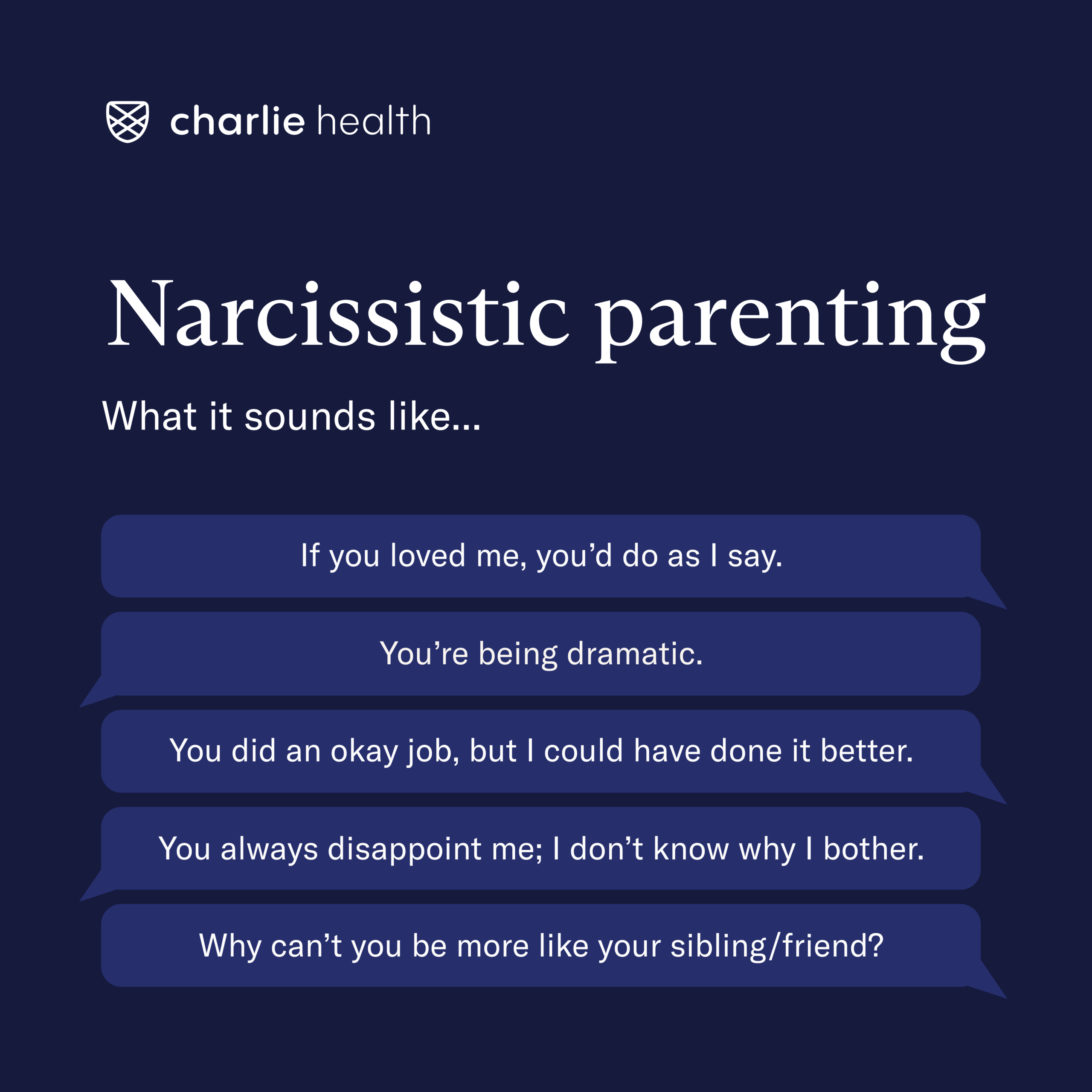
Table of Contents
10 Symptoms of Daughters of Narcissistic Mothers
Written By: Charlie Health Editorial Team

Clinically Reviewed By: Dr. Don Gasparini
September 5, 2023
10 min.
Being raised by a narcissistic mother may have lasting effects on your attachment style, self-esteem, mental health, and more. Keep reading to learn more.
Learn more about our Clinical Review Process
Table of Contents
What are 10 symptoms of daughters of narcissistic mothers?
A mother who is self-obsessed or needs constant attention may be described as “narcissistic” or a “narcissist,” but narcissistic mothers are actually mothers who display traits of or have been diagnosed with narcissistic personality disorder (NPD). Being the daughter of a narcissistic mother can have a long-term effect on your attachment style, self-esteem, mental health, and more. If you think your mother may be a narcissist or were raised by a mother diagnosed with NPD, you may experience some common symptoms outlined below. The effects of being raised by a narcissistic mother will vary from person to person, but here are 10 common symptoms of daughters of narcissistic mothers.

We’ll help you get your mental health back on track.
Fill out our quick form below to learn if Charlie Health is right for you
1. Extreme self-criticism
Daughters of narcissistic parents, particularly narcissistic mothers, often experience extreme self-criticism which is projected onto themselves and those around them. This can contribute to feelings of inadequacy and a constant need for perfection.
2. Lack of empathy
Daughters of narcissistic mothers often find themselves trapped in a dynamic where their parent consistently lacks empathy towards them, causing their own needs and feelings to be routinely disregarded and invalidated in favor of the mother’s self-centered focus. This lack of empathy can leave daughters feeling unseen, unheard, and emotionally neglected, impacting their sense of self-worth and ability to form healthy relationships in the future.
3. Verbal aggression
Daughters of narcissistic mothers often endure the painful experience of verbal aggression, as their mothers frequently employ demeaning language and hurl insults towards them. This constant barrage of hurtful words can profoundly impact the daughter’s self-esteem and mental well-being, leading to feelings of insecurity, self-doubt, and emotional turmoil. It is crucial for these daughters to recognize that they deserve respect and support, and seek healing through therapy and building a strong support network.
4. Insecure attachment style
Growing up with a narcissistic parent, particularly a mother, can often result in the development of an insecure attachment style. This is largely attributed to inconsistent or neglectful parenting practices, leading to difficulties in forming healthy and secure relationships later in life.
5. Low self-esteem
Daughters of narcissistic mothers often struggle with low self-esteem and have a negative self-image. This negative self-image can manifest in various ways, such as feeling unworthy or inadequate, constantly seeking validation from others, or being overly critical of oneself. It can significantly impact their overall sense of self-worth and hinder their ability to pursue their goals and dreams confidently.
6. Lack of boundaries
Daughters of narcissistic mothers often face significant challenges in establishing and maintaining healthy boundaries due to their parent’s difficulty in respecting these boundaries. The blurred lines between personal space and autonomy can cause immense distress and confusion for the daughters, making it difficult for them to develop a strong sense of self and navigate healthy relationships. It is crucial for these daughters to prioritize self-care, seek therapy if needed, and learn strategies for setting and enforcing boundaries to regain control over their own lives and well-being.
7. Codependency
Daughters of narcissistic mothers may develop codependency patterns in their relationships, seeking validation and approval from others. This codependency can stem from the deep-rooted belief that their worthiness and value as individuals are dependent on the opinions and actions of others. They may find themselves constantly sacrificing their own needs and desires in order to please others, often at the expense of their own well-being. Breaking free from these codependent patterns requires self-reflection, setting boundaries, and cultivating a stronger sense of self-worth independent of external validation.
8. Fear of abandonment
Due to inconsistent parenting and emotional manipulation, daughters of narcissistic mothers may have a fear of being abandoned or rejected. . Healing from this fear requires addressing the underlying wounds caused by their narcissistic upbringing and learning to trust and form healthy, secure attachments with others. Seeking therapy and support can be instrumental in navigating and overcoming these challenges.
9. People-pleasing behavior
Daughters of narcissistic parents, including narcissistic mothers, often engage in people-pleasing behavior to gain approval and avoid conflict. This people-pleasing behavior can become ingrained as a coping mechanism, causing them to constantly prioritize the needs and wants of others over their own, leading to a sense of self-neglect and an inability to assert their own boundaries and desires. Breaking free from this cycle involves learning to prioritize your own needs instead of the needs of others.
10. Difficulty expressing emotions
Growing up with a narcissistic mother can result in difficulty expressing emotions and even identifying one’s own feelings. This emotional repression can stem from the fear of facing criticism or rejection for expressing emotions, leading to a disconnect from one’s own emotional needs and an inability to effectively communicate and navigate relationships. Developing emotional awareness and seeking therapy can help daughters of narcissistic mothers reconnect with their emotions and learn healthy ways
What does it mean to have a narcissistic mother?
As mentioned, having a narcissistic mother means that your mother displays traits of or has been diagnosed with NPD. Narcissistic mothers prioritize their needs and crave admiration, often lacking empathy for their children, including their daughters. They may use manipulation and control tactics, such as gaslighting and guilt-tripping, and struggle to respect boundaries, invading their children’s privacy and autonomy.
Emotional abuse is prevalent in households with narcissistic mothers. Narcissistic mothers may constantly criticize, belittle, and behave demeaningly toward their children—including their daughters. This can damage the self-esteem and emotional well-being of daughters of narcissistic mothers.
Also, narcissistic mothers may depend on favoritism in families with more than one child. They may establish roles within the family, choosing one child as the golden child, who receives favoritism and excessive praise, while the other is the scapegoat who is blamed for everything that goes wrong. This dynamic can negatively affect all children, regardless of their role in the family.

What are some examples of things a narcissistic mother might say to her daughter?
Gaslighting and invalidating statements
Backhanded compliments
Guilt-tripping and emotional manipulation
Comparison and undermining
-
- “You’re just too sensitive.”
-
- “That never happened; you must be imagining things.”
-
- “You always overreact. It’s all in your head.”
-
- “You did well, but I could have done it better.”
-
- “You’re pretty, and you have me to thank for that.”
-
- “It’s great that you got that promotion, but don’t forget who helped you along the way.”
-
- “After everything I’ve done for you, this is how you repay me?”
-
- “You always disappoint me; I don’t know why I bother.”
-
- “If you loved me, you would do as I say.”
- “Why can’t you be more like your sibling/friend?”
- “You think you’re so special, but there are plenty of people who are much better than you.”
- “You got an A? Well, I heard so-and-so got all A+s.”
Gaslighting and invalidating statements
Gaslighting is often used by narcissistic mothers to undermine their daughter’s perception of reality. By dismissing their daughters’ emotions and experiences, narcissistic mothers seek to erode their daughters’ self-confidence and make them doubt their reality. A narcissistic mother may say gaslighting and invalidating statements to her daughter like:
- “You’re just too sensitive.”
- “That never happened; you must be imagining things.”
- “You always overreact. It’s all in your head.”
Backhanded compliments
Narcissistic mothers may deliver compliments that are thinly veiled insults or serve to diminish their daughter’s achievements. These backhanded compliments serve to maintain the mother’s superiority while subtly undermining the daughter’s self-esteem. Examples of backhanded compliments narcissistic mothers may say to their daughters include:
- “You did well, but I could have done it better.”
- “You’re pretty, and you have me to thank for that.”
- “It’s great that you got that promotion, but don’t forget who helped you along the way.”
Guilt-tripping and emotional manipulation
Narcissistic mothers often excel at emotional manipulation and use guilt as a tool to control their daughters. These guilt-inducing statements put the daughter in a constant state of obligation and make them feel responsible for their mother’s happiness, furthering the cycle of control. Narcissistic mothers may say things to their daughters like:
- “After everything I’ve done for you, this is how you repay me?”
- “You always disappoint me; I don’t know why I bother.”
- “If you loved me, you would do as I say.”
Comparison and undermining
Narcissistic mothers may compare their daughters unfavorably to others or undermine their accomplishments to maintain their own sense of superiority. By diminishing their daughter’s achievements and fostering a sense of inadequacy, narcissistic mothers exert control over their self-esteem. Examples include:
- “Why can’t you be more like your sibling/friend?”
- “You think you’re so special, but there are plenty of people who are much better than you.”
- “You got an A? Well, I heard so-and-so got all A+s.”
Does having a narcissistic mother mean you will experience narcissistic abuse?
Having a narcissistic parent, including a narcissistic mother, does not necessarily mean that you will experience narcissistic abuse. While narcissistic mothers are more prone to engaging in abusive behaviors than non-narcissistic mothers, the impact and extent of the abuse on their daughters can vary based on the severity of the mother’s narcissism, their specific behaviors, and the coping mechanisms of the daughter.
For daughters of narcissistic mothers who experience narcissistic abuse, the abuse can take various forms, including manipulation, gaslighting, mind games, projection, and passive-aggressive silent treatment. Narcissistic abuse can harm a daughter’s self-esteem, emotional well-being, and overall development.
Do narcissistic mothers expect their daughters to behave like them?
One common question that arises when discussing narcissistic mothers is whether they expect their daughters to act like them. The answer to this question is nuanced and can vary depending on the dynamics of the specific mother-daughter relationship. While narcissistic mothers often see their children—including their daughters—as extensions of themselves, their expectations for their daughters’ behavior may not necessarily align with their own.
Narcissistic mothers tend to view their children as objects to fulfill their own needs and desires. They may manipulate and control their daughters, seeking to mold them into a reflection of their own idealized self-image. However, this does not necessarily mean that they expect their daughters to behave in exactly the same way as them. Instead, narcissistic mothers may expect their daughters to meet their emotional and psychological needs, rather than focusing on their own wellbeing.
In some cases, narcissistic mothers may even perceive their daughters’ independent thoughts, opinions, and actions as threats to their sense of superiority. They may pressure their daughters to conform to their expectations and enforce a codependent relationship, where the daughter’s role is to provide constant admiration and validation. This can lead to an oppressive environment that inhibits the daughter’s ability to develop her identity and make choices based on her own desires and values.
Ultimately, every relationship between a narcissistic mother and her daughter is unique, and the expectations placed on the daughter’s behavior can vary. While some narcissistic mothers may explicitly demand their daughters to emulate them, others may subtly manipulate their daughters into complying with their wishes without overtly expecting identical behavior.
Are daughters of narcissistic mothers at risk of becoming narcissists themselves?
Daughters of narcissistic mothers may be at an increased risk of developing narcissistic traits, but this outcome is not a given and varies from person to person. Whether or not the daughter of a narcissistic mother becomes a narcissist hinges on several factors, including the daughter’s innate personality, access to support systems, and the extent of the narcissistic mother’s influence.
Some daughters may actively work to break the cycle of narcissism, seeking therapy or self-awareness to avoid replicating harmful behaviors. On the other hand, other daughters of narcissist mothers may exhibit self-centered tendencies or a strong desire for external validation—behaviors that can be linked to NPD. However, many daughters can also develop resilience and adaptability, learning important life skills, empathy, and emotional intelligence as they navigate the challenges posed by a narcissistic mother.

How might having a narcissistic mother affect a daughter’s mental health?
Growing up with a narcissistic mother can have profound implications for a daughter’s mental well-being. The experience often leaves lasting emotional scars and trauma. The constant demand for attention, manipulation, and emotional neglect can lead to feelings of insecurity, anxiety, and diminished self-esteem. Daughters raised by narcissistic mothers often grapple with questions of self-worth and identity, struggling to feel valued or significant.
Establishing healthy boundaries can also be challenging for daughters raised by narcissistic mothers since the mother’s needs consistently overshadow the child’s during childhood. This difficulty in setting boundaries and recognizing one’s own needs can affect mental health and personal relationships into adulthood.
A narcissistic mother’s erratic and unpredictable parenting style can hinder emotional regulation, making it tough for some daughters to manage stress, express emotions, and develop healthy coping strategies—all skills that are necessary for maintaining good mental health. Some daughters of narcissistic mothers might even unconsciously adopt certain narcissistic traits as a survival mechanism, further complicating their interactions with others.
Seeking therapy and support from professionals well-versed in trauma and narcissistic abuse is crucial for daughters of narcissistic mothers, as it can facilitate healing and address the mental health effects of this upbringing.
Healing from the trauma of a narcissistic mother with Charlie Health
Are you the daughter of a narcissistic mother looking to process your trauma, heal, and grow? If so, Charlie Health is here to help. Start healing with our virtual Intensive Outpatient Program, which combines group sessions with individual and family therapy for people and families dealing with various serious mental health struggles, including trauma and narcissistic abuse. In this program, you will be matched with a trauma-informed therapist who meets your needs. You will also be matched with a personalized group and get the chance to connect with peers who face similar struggles. Coping with trauma isn’t always easy –– but with trauma-informed care and a supportive community, you can heal from emotional trauma and even grow from it.




